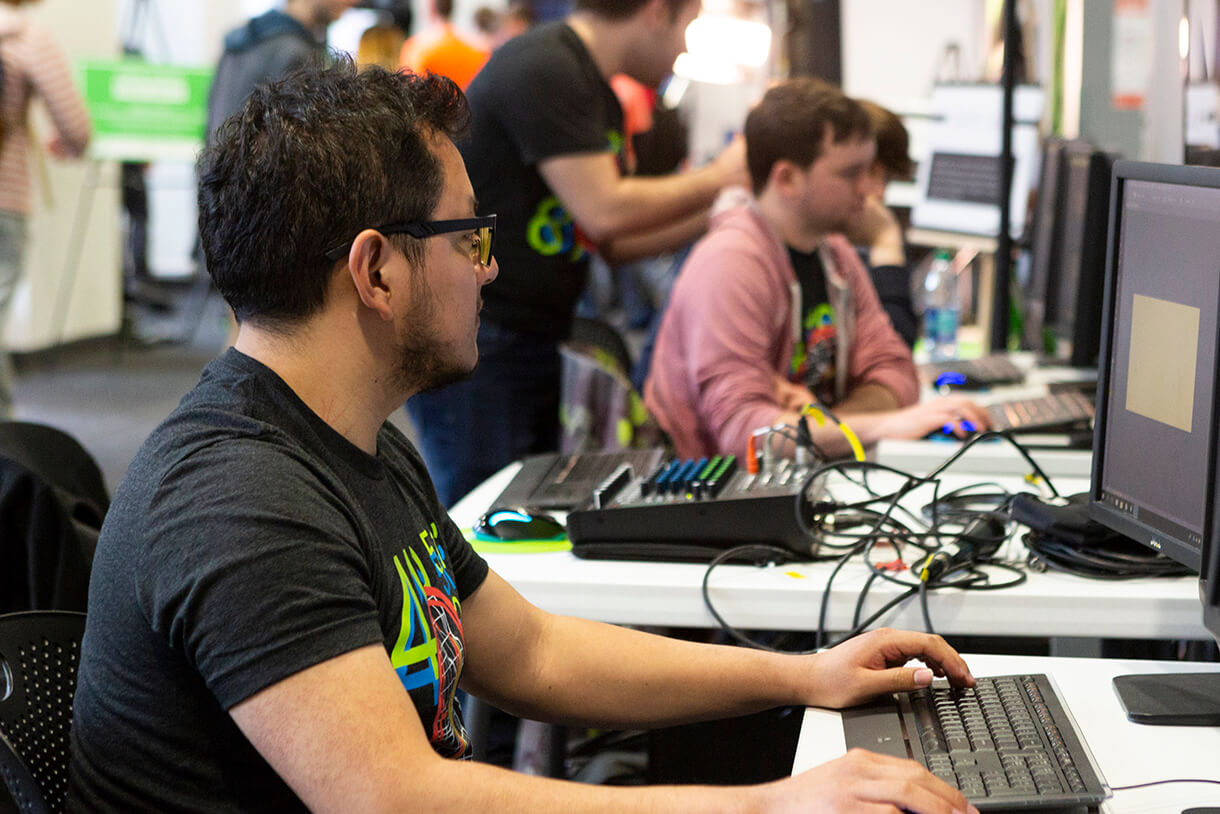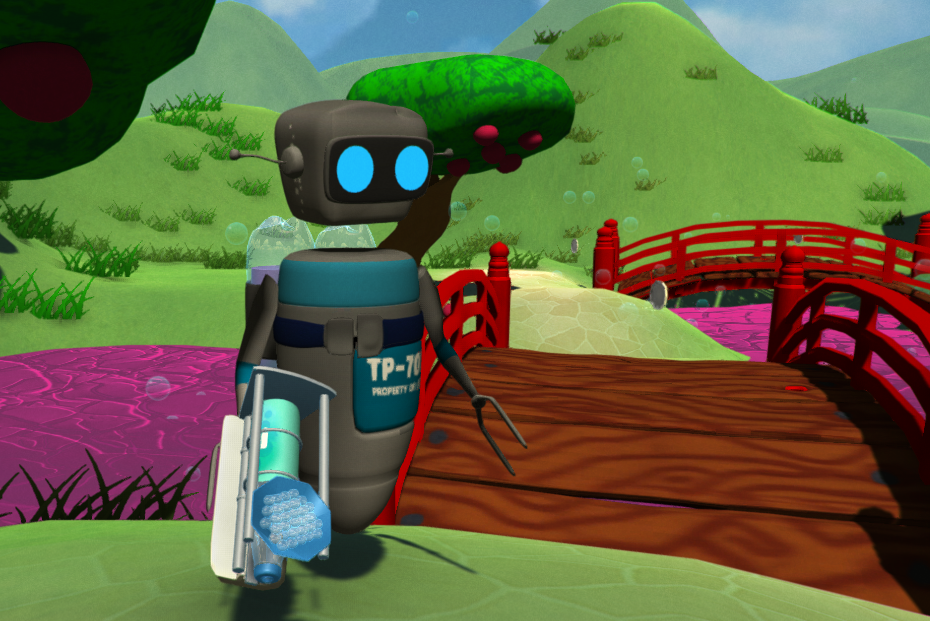Programming (BA | BS)
Create the code that drives games, simulations, and other interactive experiences. At Columbia College Chicago, we teach programming as an artistic practice that combines theory and practical application to bring ideas to life. Programming is an art form that takes practice. That’s why you’ll start making games and applications your first year and build your confidence and skills throughout your time at Columbia. You’ll work in team environments to develop your collaboration skills and create a portfolio of games and applications that can help you land a job as a programmer in a variety of fields.
We offer a Bachelor of Arts (BA) degree and a Bachelor of Science (BS) degree in Programming. You’ll take a number of scripting, programming, physical computing, and game development courses in both degrees, but Bachelor of Science students take additional mathematics courses. Within the BA or BS degree, choose from two concentrations: Application Programming and Game Programming.

Concentrations

Application Programming
In this program you’ll develop software for a variety of platforms. You’ll study different programming languages like C++ and take courses on advanced topics like artificial intelligence, physical computing, and database design. Bachelor of Science (BS) students take rigorous mathematics courses that prepare them for advanced computer science studies in graduate school, but both the BA and the BS prepare our graduates for work as commercial or independent software engineers.

Game Programming
Video games are complex creations, and programmers are the people who make all the pieces work together. As a Game Programming student, you’ll learn to develop games, simulations, and other game-like interactive experiences. Some students have even released the games they’ve created in class on the App Store.
You’ll learn programming languages applicable to games and software development. We work in game engines like Unity, so you’ll build game engine pieces in the same environments that gaming professionals use. During your senior year, you’ll work on a collaborative team to create an entire game from idea to product, giving you experience and portfolio pieces to use on the job market after graduation.
Degrees Offered
Columbia College Chicago offers both Bachelor of Arts (BA) and Bachelor of Science (BS) degrees in Programming. Both degrees offer a challenging curriculum designed to prepare you for a number of post-graduate options.
Programming, Bachelor of Arts (BA)
The Bachelor of Arts (BA) in Programming gives students an overview of programming and a flexible curriculum that allows time to explore other interests and take electives outside the major. The Programming BA requires 51 credits within the major.
Programming, Bachelor of Science (BS)
The Bachelor of Science (BS) in Programming has similar curriculum to the BA option but requires more coursework in science and mathematics. These additional courses prepare students for software engineering careers or graduate study in computer science. The Programming BS requires 70 credits within the major.
In the Classroom
What to expect your first year
You’ll hit the ground running, learning core theory in Introduction to Programming and immediately putting it into practice. In Object Oriented Programming, you’ll build upon the programming theory you’ve already learned. If you’re an Application Programming student, you might look into courses like Fundamentals of Interaction or Computer Architecture. Or, you can take Intro to Game Development, a course that identifies the characteristics of the different game genres and the career paths in the gaming industry. Here, you’ll learn the differences between game art, game design, and game programming, and you’ll explore all aspects of creating a video game. You’ll learn what makes programming objects and effects within the game so appealing.
What to expect your last year
During your senior year, you’ll take part in a capstone course. If you’re an Application Programming student, you’ll enroll in the Interactive Arts and Media Team course and join a dynamic interactive production team with students from the Interaction Design degree program. Game Programming majors enroll in our Game Studio capstone with other gaming majors and develop an entire game in the course of two semesters.
Capstone courses
We offer two unique capstone experiences for our Application Programming and Game Programming students.
Interactive Arts and Media Team capstone
- Solve a problem for a real client with an interactive production team.
- Test your technical and creative skills and, most importantly, your ability to work collaboratively.
- Create and implement real solutions for real clients like the Special Olympics, Six Flags, the Field Museum, and other companies in Chicagoland and beyond.
Game Studio capstone
- The capstone was developed by our faculty members to mirror the gaming-industry production model.
- Work in small (Indie Game Studio) or large (Large Team Game Studio) groups to develop a game.
- Over two semesters, your team will pitch the initial concepts, design all the necessary art and sound assets, test prototypes, and deliver a playable game.
- Work in collaborative teams made of seniors from Game Art, Game Design, Game Programming, and Game Sound.
- Graduate with a portfolio of work that will help you launch a career in the game industry.
Outside the Classroom
You’ll get real-world opportunities to show your stuff while you’re in school. The opportunities differ from year to year, but in the past, students have tested their skills, networked with professionals, and shown off their work at events like
- The Game Developers Conference (GDC) in San Francisco: the world’s largest professionals only game-industry event.
- The Chicago Toy and Game Fair: Indie Team Game Studio students often showcase their work at this event.
- South by Southwest (SXSW): compete in events like the Music Hackathon, where participants develop a prototype for a music app in just 24 hours.
- Industry Night: the Interactive Arts and Media Department’s annual event, where graduating seniors show their work to industry professionals from across the country.
Alumni
Kevin Bolander ’13
Kevin Bolander builds futuristic, large-form touchscreen displays for Coca-Cola and other leading companies.
Related Minors
Related minors for Programming majors
Faculty
Our faculty members are working professionals and experts in the field. They’re award-winning game designers, accomplished audio artists, and expert programmers. And they’re dedicated teachers, bringing their knowledge of groundbreaking theories and techniques into the classroom.
